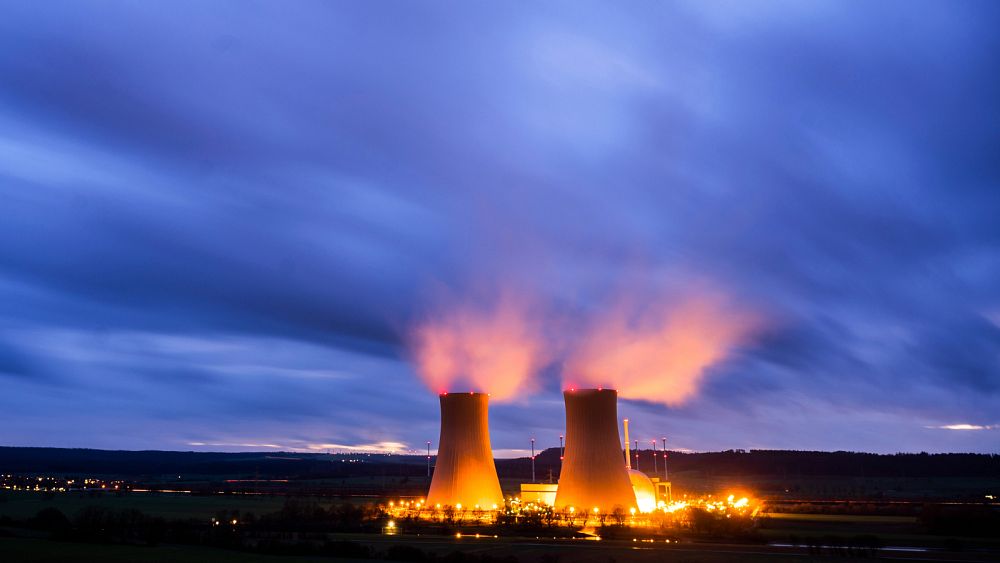
Germany’s nuclear phase-out has entered its penultimate phase today, as the country shuts down half of its six nuclear plants still operating, marking the beginning of an 11-year plan.
Under Germany’s energy transition policy, the Gundremmingen, Brokdorf, and Grohnde nuclear power plants will be decommissioned on December 31, 2021.
The Gundremmingen power plant still produces 10 billion kWh of power per year, though parts of it have already been shut down — enough to provide the entire Munich metropolitan region with electricity.
A target of protests by opposition to nuclear power in the 1980s, the Brokdorf plant will shut down at midnight on New Year’s Eve, much to its overseers’ disdain.
“The last few days have been accompanied by a fair amount of melancholy. We have operated the plant for 35 years. We looked after it, we kept it at the best technical level and we always operated it safely,” revealed Guido Knott, chairman of the management board at the operating company PreussenElektra.
However, no melancholy or remorse was felt by Karsten Hinrichsen, a longtime anti-nuclear activist known as the “Brokdorf rebel”.
“I am quietly but steadily rejoicing that the thing is now shut down. This is not euphoria. Some people ask me if this is a victory. No, it’s not, it’s taken far too long for that,” Hinrichsen said.
By the end of 2022, Germany will have achieved its goal of completely phasing out nuclear power, set by Chancellor Angela Merkel on May 30, 2011, in the wake of the Fukushima disaster.
The plan represented a dramatic change of course by Merkel’s ruling Conservatives, who just a few months earlier had agreed to extend the lifespan of Germany’s oldest power stations.
But it was met with widespread public support in a country with a powerful anti-nuclear movement, fuelled first by fears of a Cold War conflict and then by disasters such as Chernobyl.
The eight oldest reactors were shut down immediately, with the remaining nine to follow in stages until 2022.
‘The village church’
In Gundremmingen, however, the decision has been a tough pill to swallow.
The nuclear power station has been “as much a part of the village as the church” and it feels as though “something is dying”, said Gerlinde Hutter, owner of a local guest house.
According to the former mayor of the village, Wolfgang Meye, it will take at least 50 years to remove all radioactive material from the site after the plant has been decommissioned.
The German government is still looking for a long-term storage site for the country’s residual nuclear waste.
Gundremmingen is not the only German village facing big changes as the country strives to implement its energy transition strategy.
Renewables have seen a spectacular rise since 2011 and in 2020 made up more than 50% of Germany’s energy mix for the first time, according to the Fraunhofer research institute — compared with less than 25% ten years ago.
The declining importance of nuclear power (12.5% in 2020) “has been compensated for by the expansion of renewable energies”, added Claudia Kemfert, an energy expert at the DIW economic research institute.
Nuclear power stations have therefore not been replaced by coal, though fossil fuel does still represent almost a quarter of the electricity mix.
Germany’s plan to close all its coal-fired power stations by 2038
In fact, the phase-out of nuclear energy has been joined by another plan, announced in 2019, to close all of Germany’s coal-fired power stations by 2038.
This presents a particular challenge for Germany, which remains the world’s leading producer of lignite.
Mining for the brown coal, which is highly polluting, continues to lead to the destruction of villages in the west of the country in order to expand huge open-cast mines.
If Germany is to free itself from lignite, renewables such as wind, solar, biomass, and hydropower will have to make up 65% of the energy mix by 2030.
Yet the country, which has long been at the forefront of wind energy in Europe, installed only 1.65 gigawatts (GW) of wind farms last year — the lowest level in a decade, according to the WindEurope advocacy group.
“To meet the government’s targets, Germany would have to add 9.8 GW of solar and 5.9 GW of onshore wind annually,” according to Kemfert.
But the development of new areas for wind or photovoltaic energy production is complex, with plans often coming up against resistance from local residents and the risk of damage to the landscape.
Unless storage and distribution can be improved via so-called virtual power plants, these new forms of energy do not have the same stability as thermal or nuclear power.
To secure its supply, Germany could therefore be tempted to build more gas-fired power stations, but this would risk reinforcing its dependence on Russia, as illustrated by the controversial Nord Stream 2 gas pipeline.
A gas-fired power station is already in the works for the town of Leipheim, just around the corner from Gundremmingen.
How many plants remain in Germany?
After the shut down of the Brokdorf, Gundremmingen, and Grohnde nuclear power plants, three plants still remain:
- Emsland (Lower Saxony)
- Isar (Bavaria)
- Neckarwestheim (Baden-Württemberg)
These three remaining power plants are expected to go offline by the end of next year, completing the 11-year phase-out.
However, the full phase-out will not be over for a long time, as the post-operational phase and the gradual dismantling of the plants, under the responsibility of operators, is expected to take many more years.
